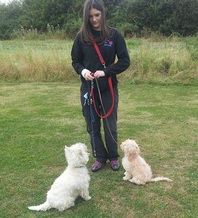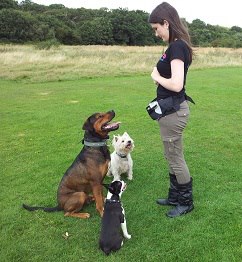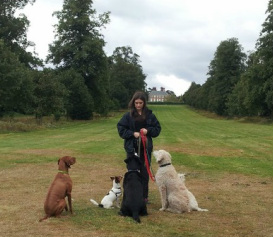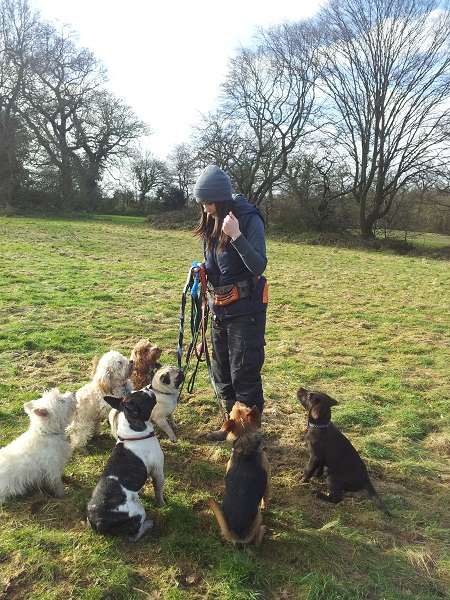Training with Elite Dog Training
|

Initial assessments usually take place in the owners own home. Lessons can however take place at other locations depending on the training required.
£60 an hour *no minimum booking although aggression cases will require a first session of 2 hours
We do not currently have facilities for group lessons however we do have stooge dogs (teaching dogs).
By utilising kind, scientifically proven methods I can make training enjoyable for both dog and owner. I train dogs in a way that they want to engage in a positive manner without force, fear or pain. The methods I use are highly effective from general obedience to behavioural issues. The dogs in my training sessions are never forced to obey an 'alpha'. True dog training is nothing like some TV trainers would have you believe.
Force-free does not mean 'no rules' or 'permissive' but instead means understanding a dogs needs and communicating in a harmonious confident way to build a relationship with trust.
Along with a small team, we work with dogs and live with dogs on a daily basis. In 2008 I started up a large, successful dog walking, dog day care and pet sitting business. My days were filled with walking and training both small and large groups of dogs with my reliable team of assistant handlers. Each dog had very specific individual needs and allot of work went into ensuring every dog had a fulfilling and safe experience. We do not use force to get the dogs to what we want. They enjoy being a part of our group without fear or intimidation and enjoy training sessions. Dogs of any age and breed are welcome. Help sheets will often be provided for clients to help them through their training journey.
At Elite Dog Training we do not use: Prong collars, electric shock collars (e-collars), choke chains or other unnecessary tools or methods of training that involve force, fear or avoidance. Our trainers do not work under the 'alpha' myth. Our aim is to work with owners to meet their requirements as much as possible while maintaining a friendly and enjoyable training environment. We are always more than happy to work with owners that have until now used aversive training methods and equipment. At some point in all of our team's training lives/careers we have been exposed to the use of such equipment and methods but educated ourselves to know that they are not only unnecessary but detrimental.
Are some problems not able to be sorted through dog training?
In extreme cases, training alone may not be enough. Usually because of a dog's underlying health problem, extreme anxiety, PTSD or a neurological problem. In these cases, a long term management plan may be the best way forward or we can advise you on a veterinary behaviourist who may be able to offer additional support with medication. If owners do not put effort into their training sessions or at home, progress will be slow to non-existent. It is therefore important to keep up with regular sessions and in contact with the team.
Will we ever recommend euthanasia?
Sadly this is a common question we're asked by owners who have come to us from other trainers who have recommended euthanising their dog as the only solution. Our policy is not to advise euthanizing dogs as we believe this is a very personal and difficult decision to be made between a client, their family and their vet. Should an owner feel they cannot provide the dog with the training / care they need we can advise them of local rescues that may be able to help. We may sometimes recommend natural / gentle remedies such as Zylkène, Rescue Remedy (the non-alcohol version) or Adaptil. Occasionally, depending on the problem, we may advise neutering but most common behavioural issues are not helped with neutering alone and in some cases neutering can worsen behaviour.
£60 an hour *no minimum booking although aggression cases will require a first session of 2 hours
We do not currently have facilities for group lessons however we do have stooge dogs (teaching dogs).
By utilising kind, scientifically proven methods I can make training enjoyable for both dog and owner. I train dogs in a way that they want to engage in a positive manner without force, fear or pain. The methods I use are highly effective from general obedience to behavioural issues. The dogs in my training sessions are never forced to obey an 'alpha'. True dog training is nothing like some TV trainers would have you believe.
Force-free does not mean 'no rules' or 'permissive' but instead means understanding a dogs needs and communicating in a harmonious confident way to build a relationship with trust.
Along with a small team, we work with dogs and live with dogs on a daily basis. In 2008 I started up a large, successful dog walking, dog day care and pet sitting business. My days were filled with walking and training both small and large groups of dogs with my reliable team of assistant handlers. Each dog had very specific individual needs and allot of work went into ensuring every dog had a fulfilling and safe experience. We do not use force to get the dogs to what we want. They enjoy being a part of our group without fear or intimidation and enjoy training sessions. Dogs of any age and breed are welcome. Help sheets will often be provided for clients to help them through their training journey.
At Elite Dog Training we do not use: Prong collars, electric shock collars (e-collars), choke chains or other unnecessary tools or methods of training that involve force, fear or avoidance. Our trainers do not work under the 'alpha' myth. Our aim is to work with owners to meet their requirements as much as possible while maintaining a friendly and enjoyable training environment. We are always more than happy to work with owners that have until now used aversive training methods and equipment. At some point in all of our team's training lives/careers we have been exposed to the use of such equipment and methods but educated ourselves to know that they are not only unnecessary but detrimental.
Are some problems not able to be sorted through dog training?
In extreme cases, training alone may not be enough. Usually because of a dog's underlying health problem, extreme anxiety, PTSD or a neurological problem. In these cases, a long term management plan may be the best way forward or we can advise you on a veterinary behaviourist who may be able to offer additional support with medication. If owners do not put effort into their training sessions or at home, progress will be slow to non-existent. It is therefore important to keep up with regular sessions and in contact with the team.
Will we ever recommend euthanasia?
Sadly this is a common question we're asked by owners who have come to us from other trainers who have recommended euthanising their dog as the only solution. Our policy is not to advise euthanizing dogs as we believe this is a very personal and difficult decision to be made between a client, their family and their vet. Should an owner feel they cannot provide the dog with the training / care they need we can advise them of local rescues that may be able to help. We may sometimes recommend natural / gentle remedies such as Zylkène, Rescue Remedy (the non-alcohol version) or Adaptil. Occasionally, depending on the problem, we may advise neutering but most common behavioural issues are not helped with neutering alone and in some cases neutering can worsen behaviour.








